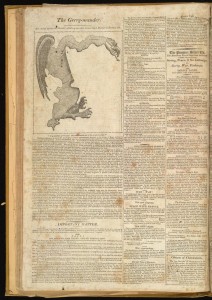(This is the third in a series of posts featuring presidential campaign items from the Library’s collections. Read the others here and here.)

“The Gerrymander. A New Species of Monster.” Boston Gazette, March 26, 1812. Serial & Government Publications Division
Every election year, as candidates go head to head during their campaigns, a new wave of vocabulary is born. Political idioms that have found their way into our lexicon include POTUS, left-wing, right-wing, working class, bipartisan, pork barrel, pundit, swing state and the list goes on and on.
So, what’s the genesis of the jargon? Let’s take a look at one:
In 1812, Jeffersonian Republicans forced through the Massachusetts legislature a bill rearranging district lines to assure them an advantage in the upcoming senatorial elections. Although Gov. Elbridge Gerry had only reluctantly signed the law, a Federalist editor is said to have exclaimed upon seeing the new district lines, “Salamander! Call it a Gerrymander.” A political cartoon-map delineating these redrawn electoral districts first appeared in the Boston Gazette for March 26, 1812. Therein lies the origin of the modern day term “gerrymandering.”
The Library also holds the original woodblocks from the 1812 Boston Gazette cartoon “The Gerry-Mander.”
